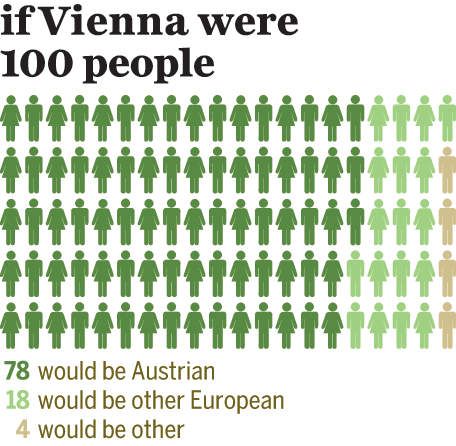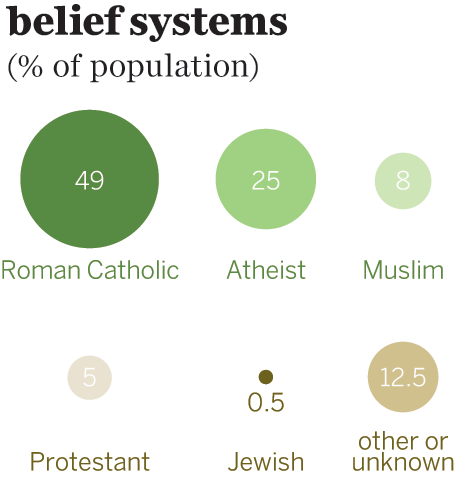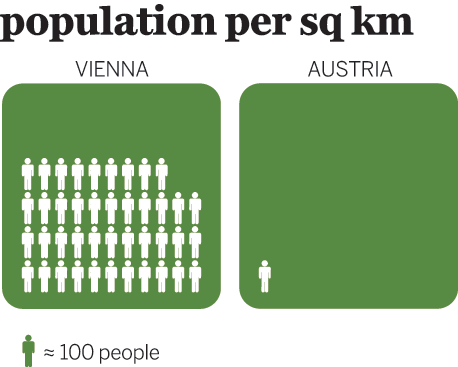Vienna Today
While Vienna enjoys one of the highest standards of living in the world, the financial crisis in the euro zone has triggered moderate discussion about the wisdom of the euro. At the same time, it remains one of the world’s most stable capitals, with a government committed to improving an already excellent infrastructure... oh, and the humble Käsekrainer sausage has been saved from extinction.
Best in Film
The Third Man (director Carol Reed, screenplay Graham Greene; 1949) One of the oldest and still most atmospheric films about Vienna.
Before Sunrise (director Richard Linklater, screenplay Richard Linklater and Kim Krizan; 1995) Well-crafted kitsch verging on the pathetic, but the city scenes couldn’t have been done better by Vienna’s tourist board.
Letter from an Unknown Woman (director Max Ophüls, based on novella by Stefan Zweig; 1948) Unrequited love set in Vienna, underscoring the fragility of the human psyche.
Best in Books
The Piano Teacher (Elfriede Jelinek; 1983) By the Nobel Prize–winning author, about a repressed pianist and a sadomasochistic relationship, which is to say, Vienna through and through.
The Road into the Open (Arthur Schnitzler; 1908) The story of an affair, set in Vienna, with insights into Viennese society and culture in the early 20th century.
The World of Yesterday (Stefan Zweig; 1943) An autobiography of Zweig’s life up to WWII, describing lots of well-known Viennese.
Crisis, What Crisis?
Despite the woes of the euro currency, Vienna and Austria as a whole have remained in relatively good economic shape, with continuing high disposable income and a quality of life that is the envy of many other Europeans. Vienna also hasn’t experienced a real-estate bubble similar to those in the US, UK and Spain, even if locals grumble about the rising cost of rental. While the country has substantial debt and banks are vulnerable to economies in eastern Europe, the Viennese mostly remain unconcerned, seeing the problems as being elsewhere.
A Stable Government
Vienna is a city-state, which means the mayor doubles as the head of a state government. Astoundingly, the capital has been governed by the Sozialdemokratischen Partei Österreichs (Social Democratic Party of Austria; SPÖ) and headed by an SPÖ mayor uninterrupted since 1945. The SPÖ has also won an outright majority of votes in the state elections all but twice since 1945 – once in 1996, and again in the 2010 election, when the right-wing populist Freiheitliche Partei Österreichs (Fredom Party of Austria; FPÖ) managed to scoop up 25% of the vote. While the FPÖ fought this election on its hobby horse of local ‘foreigner’ issues (misuse of asylum laws, assimilation of foreigners), the SPÖ successfully wooed voters on its good record and longer-term infrastructure and quality-of-life issues, and today the SPÖ governs Vienna in coalition with the Greens party. At national level, the rise of the populist euro-sceptic Frank Stronach (Team Stronach) might well pan out into fewer votes for the FPÖ at the next national election, due to be held in late 2013.
Building a Contemporary City
Vienna has been the scene of some enormous infrastructure projects in recent years. The one with the most impact on visitors is its new Hauptbahnhof (main train station), which is part of a massive project to transform the formerly down-at-heel – if not outright sleazy – Südbahnhof area into a bright new quarter called the Sonnwendviertel (Solstice Quarter), complete with the station, about 5000 new apartments, shops and its own kindergarten and schools. By about 2015 almost everyone arriving by train in Vienna will step out here. Meanwhile, numerous other key projects and initiatives such as a Gender Mainstreaming initiative – shaping the city so it’s just as safe and usable for women as well as men – are ensuring that Vienna remains highly liveable and retains its cultural edge.
Changing Face of the City
Vienna’s face is changing east of the Danube Canal where a new campus of the Vienna University of Economics and Business is opening up in 2013, just a stone’s throw from the Prater’s emblematic Ferris wheel. This is unleashing a wave of Austrian and international business students on the Leopoldstadt area and will pep up the district considerably.
Europe Going East & ‘Save the Käsekrainer’
Vienna is one of the better Europeans in terms of accepting the edicts of the EU, but it also has a strong grassroots democracy, with regular referendums on anything from lowly parking to lofty issues of government. An important one saw a rejection of any steps leading to a privatisation of essential services, taking aim at a directive by the EU that looks set to open the way for privatisation of water supplies across Europe.
At the same time, Vienna is active in promoting integration with eastern neighbours, such as through Centrope Europaregion, a cross-border cultural and economic initiative with parts of Austria, the Czech Republic, Hungary and Slovakia to create an integrated region.
At European level ‘es ging um die Wurst’ (it came to a crunch) in 2012 when Slovenia sought EU protection for its Kranjskaja Klobasa as a regional food. This is the humble forebear of the Viennese Käsekrainer (Krainer Wurst) sausage and – spare the thought! – almost compelled a name change at sausage stands around town. The dispute turned out to be a flash in the frying pan, however; a compromise was reached, according to which Slovenians would continue to eat their regional Kranjskaja Klobasa , while the Viennese would bite into their own Krainer .



